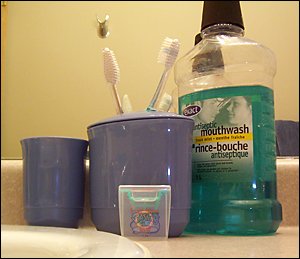 Halitosis, or bad breath, is one of the most common oral health concerns. The tricky part about having bad breath is that you might never know whether your breath stinks or not unless someone tells you.
Halitosis, or bad breath, is one of the most common oral health concerns. The tricky part about having bad breath is that you might never know whether your breath stinks or not unless someone tells you.
There are a number of reasons why a person might have bad breath, which includes underlying diseases. Diet, stress, cigarette smoking and alcohol consumption may also trigger halitosis, but bad breath can easily be addressed if it is caused by one or more of these factors. Here are a few tips for dealing with bad breath:
1 – Brush your teeth regularly
This is probably the most overlooked advice out there. The fact of the matter is that food debris left after eating encourages bacterial growth. For this reason, it is always a good habit to brush your teeth after each meal. Just because you brushed your teeth before eating your breakfast does not mean you’ll have fresh breath throughout the day. When brushing, make sure to pay special attention to your tongue, cheek and teeth.
2 – Evaluate your diet
There are certain foods which are notorious for causing bad breath, the most common onesbeing garlic and onions as well as other spices. A person who is always indulging in dishes that are rich in these ingredients will be more likely than others to have halitosis. Cut back on these foods and you’ll notice a dramatic improvement in your breath.
3 – Chew gum
There is a reason why people secrete saliva. Other than its function of preliminarily digesting carbohydrates in the mouth, saliva also has anti-bacterial properties that prevent the overgrowth of bacteria. This is why mouth the tends to smell after sleeping. Secretion of saliva slows down when a person is sleeping. Chewing gum throughout the day will stimulate saliva secretion, keeping the growth of bacteria at bay.
4 – Floss daily
Although brushing is the first line of defense against halitosis and should never be taken for granted, brushing is not effective at removing food particles that are stuck in between teeth. For this reason, a person should floss at least once a day most preferably during the evening.
5 – Use mouthwash
Alcohol free mouthwash is perfect for when a person does not have a toothbrush but it should never substitute brushing your teeth. It is a temporary solution to bad breath and is great for emergency situations.
6 – See your dentist at regular intervals
Cavities and cracks are wonderful bacterial breeding grounds. Have your dentist check your teeth for cavities, and have any crack or cavity corrected.
About the author: Elliot Pearson writes for Dentist Identity, a company that provides dental websites and dental SEO services.